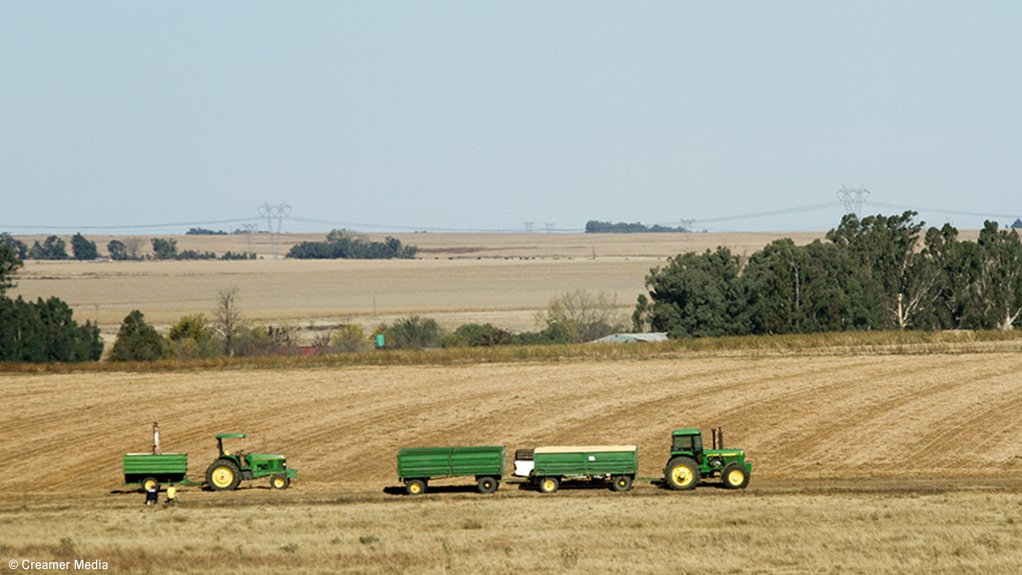Industry body Agri SA says it is hopeful that the Medium-Term Budget Policy Statement (MTBPS), to be delivered by Finance Minister Enoch Godongwana on Wednesday afternoon, will outline critical measures to support the agricultural sector amid several crises that threaten the sector’s continued growth.
“Coming so soon after the crippling Transnet strike, with ongoing loadshedding and high input costs, Minister Godongwana must use the opportunity of the MTBPS to signal interventions that help to bolster the sector, which [accounts for about] 874 000 jobs and contributed more than 2% to gross domestic product (GDP), despite the challenges of the past three years,” the organisation states.
It notes that the MTBPS comes shortly after Agri SA’s 2022 Congress, where the challenges facing the agricultural sector were ventilated to government leaders and representatives of State-owned enterprises and the private sector.
“With the magnitude of the problems now clear, Minister Godongwana must give particular attention to measures that safeguard the top-performing and labour-intensive agricultural sector.
“Among the interventions within Minister Godongwana’s control is the provision of tax relief for hard-hit agricultural industries. Tobacco, grape and cane farmers are among those hit hard by high fertiliser and fuel prices. These industries, therefore, need relief from ‘sin taxes’ that only further reduce their ability to withstand current price pressures,” Agri SA notes.
Industry body SA Canegrowers, meanwhile, is calling on the Minister to provide the sugar industry with a signal as to what may happen with the Health Promotion Levy (HPL), which is also known as the sugar tax, in future.
“With high input costs already weighing down the agricultural sector, the added burden of the HPL on the sugar industry, despite there being no evidence that the tax has reduced obesity levels in the country, poses an existential threat to South Africa’s 21 000 small-scale growers and must be eliminated,” it suggests.
SA Canegrowers points out that Godongwana had, during his February Budget Speech, announced an increase in the tax, but later postponed the proposed increase to April 2023 to allow for further consultation on lowering the 4g threshold and extending the levy to fruit juices.
“While this postponement provided some relief for growers, the prolonged enforcement of the HPL has continued to hamstring the industry, which has also been faced with other cost pressures, including a spike in fertiliser and energy prices, along with ongoing bouts of loadshedding.
“While SA Canegrowers has written to the Minister to request a meeting to discuss the HPL, we have received no response to date. We have, therefore, also written to President Cyril Ramaphosa requesting his intervention in this long-running problem to provide desperately needed relief for the industry by eliminating the sugar tax,” the organisation says.
It adds that, given the country’s high unemployment rate, South Africa cannot afford to imperil jobs.
“For the sake of the one-million livelihoods that depend on the industry, Minister Godongwana must use the opportunity of MTBPS to finally signal the elimination of the calamitous and ineffective sugar tax,” SA Canegrowers states.
OTHER INTERVENTIONS
Agri SA further suggests that the National Treasury review the diesel rebate announced by the South African Revenue Service (Sars) on March 18, stating that the unilateral changes announced by Sars fell short of meeting farmers’ needs on critical points.
“Rather, they lowered the refund percentage of the General Fuel and Road Accident Fund levies and failed to provide certainty of key issues such as logbook formats,” the organisation notes.
It also calls on Treasury to reconsider the proposed limitation on the assessed losses that businesses can write off against their taxable income.
“For cyclical sectors like agriculture, this allowance is often a lifeline and a key contributor to making continued agricultural production financially viable. A disadvantageous amendment, especially in the midst of an ongoing cost crisis, would be a calamitous and costly mistake,” Agri SA says.
In addition, the industry body is calling on Godongwana to review proposed changes to the Financial Intelligence Centre Act (FICA), which would see suppliers of high-value goods become subject to FICA requirements in respect of transactions exceeding R100 000.
“Were this proposal adopted, it would impose significant administrative costs on already embattled farmers. It is therefore essential that this proposal is withdrawn,” it says.
EMAIL THIS ARTICLE SAVE THIS ARTICLE ARTICLE ENQUIRY
To subscribe email subscriptions@creamermedia.co.za or click here
To advertise email advertising@creamermedia.co.za or click here











